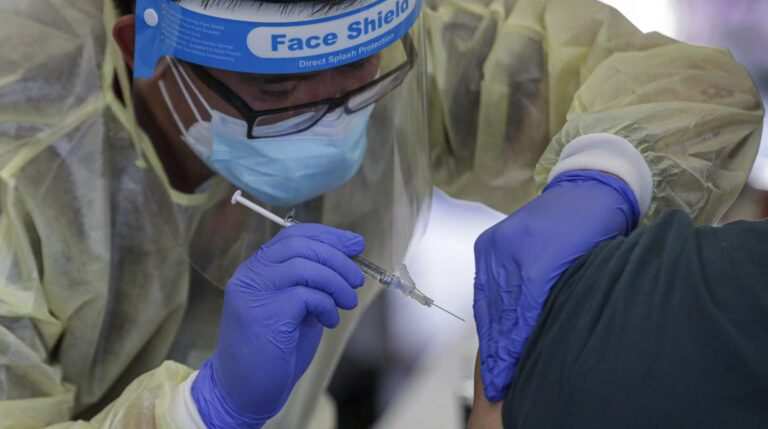
Federal health officials said Tuesday that they were urging a pause in the use of Johnson & Johnson’s COVID-19 vaccine after reports of six serious blood clots.
The announcement is a severe blow to the U.S. vaccination campaign, which has counted on public faith in the rapidly developed inoculations and growing supplies in order to protect Americans from the coronavirus and bring an end to the pandemic.
The Centers for Disease Control and Prevention has scheduled an emergency meeting for Wednesday.
“Until that process is complete, we are recommending a pause in the use of this vaccine out of an abundance of caution,” said a joint statement from Anne Schuchat, principal deputy director of the CDC, and Dr. Peter Marks, director of the Food and Drug Administration’s Center for Biologics Evaluation and Research. “This is important, in part, to ensure that the healthcare provider community is aware of the potential for these adverse events and can plan for proper recognition and management due to the unique treatment required with this type of blood clot.”
There are no changes to federal guidance on the Pfizer and Moderna vaccines.
Unlike those two, the Johnson & Johnson vaccine requires only one shot and does not need to be stored at extremely cold temperatures, making officials optimistic that it could be administered and transported more easily. Roughly 7 million Americans have already received a dose of the Johnson & Johnson vaccine.
However, the New Jersey-based company has been battling perceptions that its vaccine is less effective than others, as well as the revelation that millions of doses produced by a Baltimore factory had to be thrown out because of quality problems. The latest announcement will likely create an even greater cloud at a time when health officials have been struggling to persuade hesitant Americans to get the first shot available to them.
Johnson & Johnson said it was aware of the reports of blood clots and was working with officials on the matter.
“At present, no clear causal relationship has been established between these rare events and the Janssen COVID-19 vaccine,” the company said in a statement, referring to the division that developed the vaccine. “We continue to work closely with experts and regulators to assess the data and support the open communication of this information to healthcare professionals and the public.”
Schuchat and Marks said that six women between the ages of 18 and 48 developed a “rare and severe” blood clot called cerebral venous sinus thrombosis six to 13 days after receiving a Johnson & Johnson vaccine.
Schuchat and Marks said the clots can be difficult to treat.
“Usually, an anticoagulant drug called heparin is used to treat blood clots,” they said. “In this setting, administration of heparin may be dangerous, and alternative treatments need to be given.”
They added that “these adverse events appear to be extremely rare” and “COVID-19 vaccine safety is a top priority for the federal government.”
Scattered cases of such clots have also arisen in Europe among recipients of the AstraZeneca COVID-19 vaccine, leading several countries to restrict use of that shot to older people. In Britain, residents under 30 will be given the choice of other vaccines as a precautionary measure.
However, the European Union’s drugs regulator has ruled that the benefits of the AstraZeneca vaccine, as a generally safe and highly effective guard against COVID-19, outweigh the risks. It has not recommended any age restrictions for recipients.
AstraZeneca says it intends to apply for emergency-use authorization of its vaccine in the U.S.
___
©2021 Los Angeles Times.
Distributed by Tribune Content Agency, LLC.
0 comments :
Post a Comment